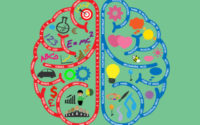Why is Imagination is vital for Learning
Why Imagination is vital for Learning
Logic will get you from A to Z. Imagination will get you everywhere – Albert Einstein.
I know that there have been numerous blogs about the topic of imagination and learning; however, I wish to throw some light on the apathy this faculty of our brains is subject to in the academics. Though the insights might not be radically new or avant garde, the need of the use of imagination as a useful tool in the process of teaching and learning is reiterated.
For most of the educationists who are caught in the rigmarole of academics, the faculty of imagination is left to the preschooler where the kid dabbles with imaginary games and storytelling for early brain development. The fallacy of this thought is stark given the fact that students tend to learn more and more abstract subjects as they progress.
Let me tell you something. In a logical subject like mathematics where many think that there is no space imagination, most of the concepts are imaginary. For example, what kind of imagination do you think a child of 12 or 14 needs to understand the concept of infinity? What about calculus and non-Euclidian geometry? Don’t you think that these concepts need a decent amount of imagination to comprehend?
Yes. The windmills of academics grind fine and leave no space for both teachers and students to linger on the concepts and allow them to sink in, in all its possibilities. However, are we trying to make students that are mechanical or do you have a conviction to make active thinkers who can contribute to the intellectual might of the country?
Imagination is such a buzzword that there are more fanciful meanings to it than it can house. Dressing students as superheroes or taking them into a trip of the Alice in the Wonderland is not using imagination for learning.
What is imagination?
A popular psychology journal defines imagination as the action of forming new ideas, the ability to concoct images, and a perception where the imagery is born out of the memory rather than the real world.
The important aspect of this definition is misrepresented by many when they associate imagination more with a dream like state rather than a cognitive skill that allows us to comprehend and survive. The art of hypothetical reasoning, planning, visualizing, comprehending language, and reconstructing the blind spots of our sensory vision is but a very vital skill without which we cannot survive.
When parents and teachers understand this aspect of imagination, the process of educating would be much simpler.
Importance of Imagination in Education
Mary Warnock, a popular thinker, once quoted that the cultivation of imagination is the main aim of education. Such is the importance of imagination in the process of education.
Though mired by perception, emotion, and memory, imagination is a faculty that is far from hallucinogenic and is an essential tool. When a student goes about trying to gauge concepts that are far from visible, this tool comes handy. It is not just restricted to the sciences. The liberal arts and fine arts need a good bit of imaginative prowess to excel.
First, I would like to clarify that the much touted role of the “age range” does not work in the context of imagination when it comes to learning. In fact, the more the age the more a student requires honing his/her imagination.
Imagination is vital to form higher level thinking, to understand nonverbal concepts, to transcend from concrete concepts to abstract concepts and to be creative.
The importance of imagination goes beyond words and forms an integral part of the brain’s way of forming patterns, images, and ideas. So, this is a humble urge to educationists and learners to lay more emphasis on imagination rather than memorizing as imagining is closer to understanding than rote.
In the next blog, we would come up with methods that would encourage imaginative learning.







